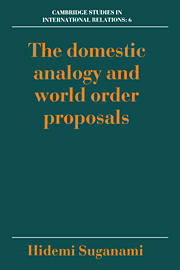Book contents
- Frontmatter
- Contents
- Acknowledgements
- Introduction
- 1 The domestic analogy debate: a preliminary outline
- 2 The range and types of the domestic analogy
- 3 Some nineteenth-century examples
- 4 Contending doctrines of the Hague Peace Conferences period
- 5 The impact of the Great War
- 6 The effect of the failure of the League on attitudes towards the domestic analogy
- 7 The domestic analogy in the establishment of the United Nations
- 8 The domestic analogy in contemporary international thought
- 9 The domestic analogy and world order proposals: typology and appraisal
- Conclusion
- Notes
- References
- Index of personal names
- Subject index
5 - The impact of the Great War
Published online by Cambridge University Press: 18 December 2009
- Frontmatter
- Contents
- Acknowledgements
- Introduction
- 1 The domestic analogy debate: a preliminary outline
- 2 The range and types of the domestic analogy
- 3 Some nineteenth-century examples
- 4 Contending doctrines of the Hague Peace Conferences period
- 5 The impact of the Great War
- 6 The effect of the failure of the League on attitudes towards the domestic analogy
- 7 The domestic analogy in the establishment of the United Nations
- 8 The domestic analogy in contemporary international thought
- 9 The domestic analogy and world order proposals: typology and appraisal
- Conclusion
- Notes
- References
- Index of personal names
- Subject index
Summary
The Great War of 1914–18 was undoubtedly among the most shattering experiences of the twentieth century. Its impact was particularly pronounced precisely because of the generally optimistic air that prevailed in the early part of the twentieth century among the thinkers on international law and international relations. George Keeton wrote:
Whereas only a few years before many publicists thought that the Hague Peace Conferences had ushered in a new era in international relationships, during which mankind could look forward to long periods of unbroken peace and steady material progress, and while they were unanimous that the respect for international law was firmly based upon a public opinion whose censure would be sufficient to deter the potential lawbreaker, the war had made it necessary to abandon these doctrines, which were in fact no more than a late outcrop from a School of Jurisprudence whose underlying philosophy was the progressive evolution of the human race towards increased law-abidingness.
(1939, 68)And in a similar vein David Mitrany wrote:
The generations of the Second World War can hardly realise what a shock that earlier event [the First World War] was – they had been prepared for violence and conflict by years of Hitler and Mussolini, of Bolshevik Revolution and the Spanish Civil War. For us 1914 followed a long period of stability and of liberal optimism, of expanding international trade and cultural intercourse, of pacifist movements and efforts – like the Hague Conferences at the turn of the century.
(1975a, 4–5)- Type
- Chapter
- Information
- The Domestic Analogy and World Order Proposals , pp. 79 - 93Publisher: Cambridge University PressPrint publication year: 1989
- 1
- Cited by

